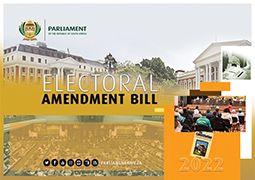
A delegation of the Portfolio Committee on Home Affairs has been urged to ensure that the Electoral Amendment Bill makes it explicit that independent candidates do not pay election deposit like political parties. The committee concluded the second of three public hearings in the Free State that form part of the nationwide public participation process promised by the committee following the Constitutional Court decision declaring the Electoral Act 73 of 1998 unconstitutional.
Independent candidates should not pay deposits, participants said, because of the lack of clarity around the funding of independent candidates. They also said that elections deposits are barriers to entry, which will limit independent candidates’ ability to participate in elections.
There was general agreement that independent candidates must be allowed to participate in both national and provincial elections, as this will strengthen democracy. Nonetheless, there were fears that the inclusion of independent candidates might contribute to careerism, with a possible rise in candidates who do not have citizens at the heart of their motivation.
“The challenge of funding for independent candidates remains a concern. You find that community recognises your ability to deliver services to them, but a candidate cannot raise the necessary funds to run a meaningful campaign. Also, the election deposit that is required will make it impossible for them to stand. This is a serious problem that keeps independent candidates up at night,” said one resident, Mr Motsamai Pelehe.
Some participants believe that democracy has not delivered all it promised, and this could be resolved by the inclusion of independent candidates. “To tell the truth the last time we have enjoyed democracy was in the days of former President Nelson Mandela. I am saying that independent candidates must be allowed, they will not be a burden to the system. The system has created problems for itself. We hope that the once we elect now will help us and deliver services,” said another resident, Mr Lebina Menyatso.
Mr Menyatso also called for younger participants in the electoral process. “We hope that young people will participate in the election process, because they will bring energy into the system. But these people must be married and have families,” Mr Menyatso emphasised.
As at other public hearings, there was widespread support for a proportional representation system, because it ensures that all sectors of society including the marginalised are represented. Participants in the public hearings also called for stricter guidelines for participation as an independent, the discarding of votes in cases where an independent candidate achieves excess votes, a clear process of objections to signatures supporting an independent candidate’s candidature and clear punishment for any person seeking to defraud the electoral system by submitting forged signature for candidature. There was also a strong view that to protect the fiscus and avoid constant by-elections, vacancies that arise must not be filled until the next national or provincial election.
Malatswa Molepo
16 March 2022

